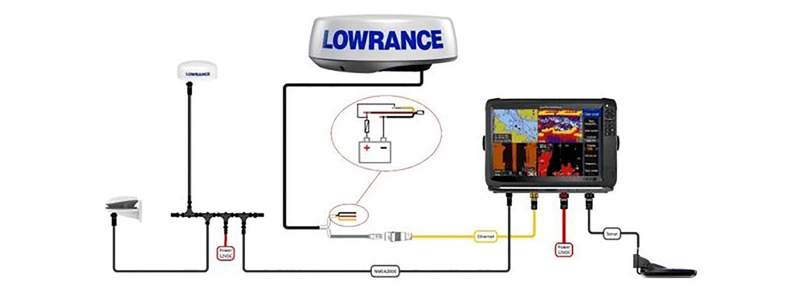Radar UnitsProducts found: 8
Sale of Radar Units
In this section the topRik marketplace offers radar units for sale in a wide range.
Look through the models presented on this page - what do you see? Right! These are brands of the world's best manufacturers of marine equipment.
Make a choice, and we will deliver the radar unit you choose anywhere on the planet. If you are confused about the characteristics when choosing, read the article below, where topRik experts give advice on how to choose a fitting model for a specific yacht.
Remember that sale of radar unit through the topRik marketplace includes a free consultation from our experts.
The importance of these devices in maritime navigation is evidenced by the fact that at International Convention for the Safety of Life at Sea (SOLAS-74) contains requirements for the presence of this equipment on different types of ships. This means that radar unit ensures navigation security, and we will now explain how this happens.
What Is Radar Unit on a Yacht and How It Is Used
Marine radar unit is a high-frequency electronic device designed to detect air, surface and coastal targets, determine their parameters, including movement parameters, and transmit information to shipboard visualization and analysis equipment.
The operation of marine radars is based on the principle of electromagnetic waves reflecting from objects - by analyzing them one can obtain information about the range, size and characteristics of the movement of objects, which is most in demand primarily for military purposes, for which, in fact, this equipment was first developed, as well as in civil - from the point of view of organizing navigation safety.
Marine radars for civil purposes are able to ensure not only the safety of navigation, but also help with fish searching. For example, SIMRAD and LOWRANCE radars allow you to select the required operating mode in accordance with the navigation situation:
- being at the open sea;
- navigation in port conditions, where traffic can be particularly difficult due to the presence of a large number of other ships, port infrastructure, fog, etc.;
- certain weather conditions, since the navigation picture may differ significantly in the presence of precipitation;
- “bird” mode, which allows you to find schools of fish at long distances by tracking the flocks of birds above the water.

Types of Radar Units
The designs of marine radars can be divided into two types: open or closed type radars. An open-type marine radar, unlike a closed one, has a visible rotating part; as a rule, it is installed on large vessels, where restrictions on the size of ship equipment are not as strict as for small vessels.
Closed-type radars are more compact in size. Various models of marine radars implement options with multiple beams of different frequency ranges, which helps create a more detailed picture, separate small targets and generally obtain more reliable information about surrounding objects.
Modern CHIRP technology, a pulse compression technology made possible by the creation of semiconductor radars, has gained significant popularity. This type of radar sends a short, multi-frequency pulse into space and then analyzes the echo. Such approach makes it possible to obtain detailed information about poorly visible targets, the presence of which along the ship’s course can be dangerous, and also significantly save radiation energy, which is again extremely important for small ships.
This, in turn, becomes possible thanks to the improvement of semiconductor technologies, which make it possible to rid the radar design of the presence of a magnetron and, by the way, has a beneficial effect on the size and weight of the device. For example, Raymarine Quantum offers not only Ethernet connectivity, but also Wi-Fi, weighs only 5.6 kg, provides a range of up to 24 nautical miles and consumes only 17 W of power. The presence of multiple beams, as well as the ability to switch between them, helps to display the current picture in the best possible way on any Raymarine compatible Quantum multifunction display.
Significant changes in radar technology over the past eight years have enhanced all of these radar benefits. Introduced back in 2009, the Simrad BR24 Broadband is the first recreational marine solid state radar to use frequency modulated continuous wave technology. Since then, the company has released 3G and 4G radar with the same technology (FMCW), and in 2015, the HALO radar, a solid-state (semiconductor) product using pulse compression technology.
The phrase “solid-state radar” simply means that the product uses semiconductor devices instead of vacuum tubes. Magnetron radars, which still compete with solid-state radars, appeared in the forties of the last century, but even today they are not an anachronism. Improvements in digital signal processing technology have given magnetron radars a new lease of life, which is why they still hold a significant market share.
The differences between magnetron radar and solid-state radar are significant. A magnetron-based radar of equivalent size weighs more and emits much more microwave power. On the other hand, solid-state devices can be very efficient at lower power while being more sensitive. Due to the significant microwave emission from magnetron radar, which is an open microwave oven, ensuring their safety to others is important. Some say that you can only be harmed by a magnetron radar if you stay in its field of action for a very long time. However, companies such as Garmin have created safety zones within their systems.
Year 2016 was marked by the appearance on the market of pulse compression radar models such as Raymarine Quantum, Garmin Fantom. In the case of Garmin, their solid state radars came with Doppler technology.
Doppler technology allows you to receive almost instantaneous information about approaching ships - reading the differences in signal frequency from an approaching vessel, it can clearly show any potential collision risks on the water. It is also used in land-based weather forecasting systems.
In the process of detecting approaching vessels, Doppler ultrasound shows them in bright color as a threat signal.
topRik marketplace also features radar units using this advanced technology.
Semiconductor solutions turned out to be in demand for the implementation of pulse compression technology, which is similar to the CHIRP technology used in echo sounders. The emitted signal changes frequency, resulting in improved resolution of the device. This allows the user to distinguish between two separate targets located close to each other.
For each manufacturing company, pulse compression may vary. Radar Simrad Halo is unique in that one regular pulse and five frequency-modulated ones allow you to stitch information together for a comprehensive display.
Some companies use shorter pulses because the shorter the pulse, the shorter the response time.
At short range, radars do not need multiple pulses. For example, depending on the size of the open-type antenna, targets at wavelengths up to 72 nm can be detected. The Quantum radar dome - which, by the way, connects to the Raymarine MFD via Wi-Fi or a wired connection - is at a wavelength of about 24 nm.
How to Choose and What to Look For When Buying
Your choices can range from low-power, no-frills radars with a black-and-white display to radars with a full-color display and GPS support that shows your vessel's progress and surrounding area with location reference.
The main thing is to know what to look for and what criteria to pay attention to when choosing radar units for sale. We suggest taking into account the most important of these criteria:
- Vessel size. Depending on the size of your vessel, select the antenna that is most suitable for free-standing installation. Typical radome diameters for small to medium sized boats are 18 or 24 inches. The radome consists of the transmitter, receiver and antenna as a single unit. The antenna should be mounted as high as possible on the boat, not according to installation convenience, as the transmitter emits radiation.
- Radar antenna type and size. Enclosed radome antennas make it easy to find a convenient mounting location on smaller yachts. Open type antennas require installation on the top of the vessel. Antenna size plays a key role in determining radar performance. Marine radars use an antenna for both reception and transmission. The pulse energy should illuminate relatively wide vertical stripes to ensure that the target area is well illuminated. At the same time, a narrow horizontal stripe is necessary so that objects located close to each other in the horizontal plane are treated as separate targets rather than as a single unit.
- Scanner output power. A higher antenna scanner output level increases the likelihood that the radar will pick up returns from objects and show them as targets on your display.
- Beam angle. This parameter is related to the length of the antenna. The longer the antenna, the smaller the beam angle. The narrow beam angle increases the resolution of a ship's radar and makes it easy to distinguish between two objects that are close to each other, and also shows the contour of the coastline with much greater resolution.
- Display type. The clarity of the image depends on the characteristics of the display.
- Power consumption. Even if you have a generator on board, most radars require less than 50 watts of battery power. New solid-state radars can reduce power consumption, but the tradeoff is cost.
Additional functions may include the ability to connect a VHF radio station, GPS antenna and echolocation unit into a single system. All this can be provided by GPS chartplotters, which expand the capabilities of the radar with an overlay of an electronic map of the area.
You can learn more about all your options if you contact topRik experts for a free consultation. Use the the quick feedback form on the Contacts page, call the specified phone number or send a message at [email protected].


